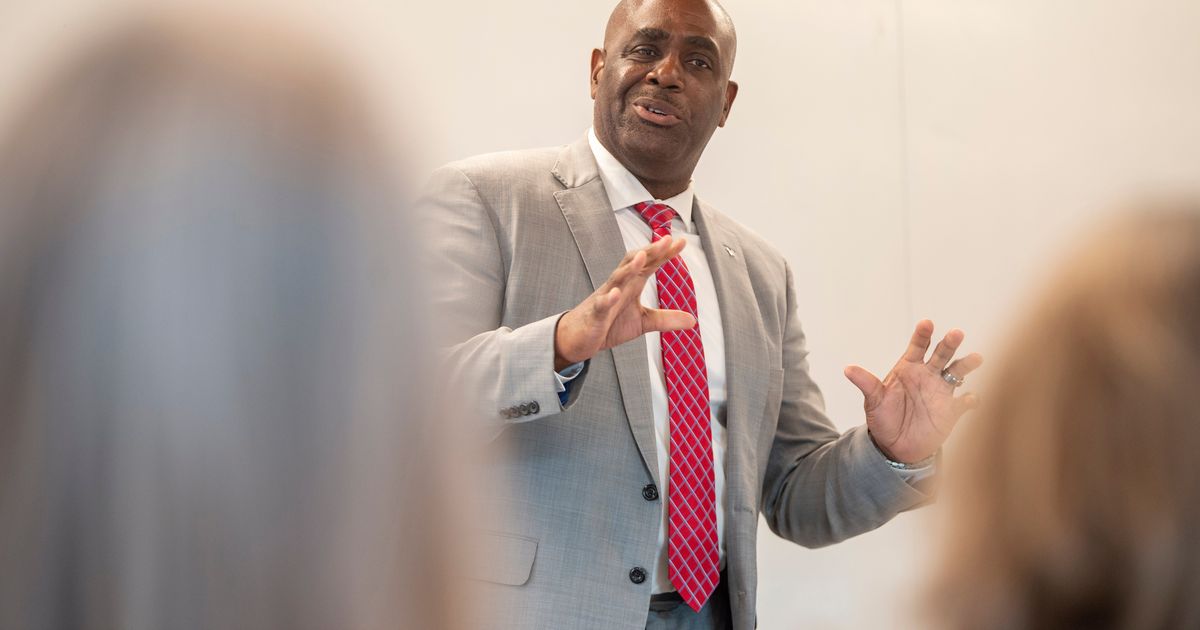The public vetting process began Tuesday for the four finalists vying to become the next president of Eastern Washington University.
The first of the four, Monroe Gorden Jr., met with members of EWU campus communities in Cheney and Spokane on Tuesday during an itinerary that included meetings with university leaders, public forums and building tours. and campuses.
Gorden, vice chancellor for student affairs at the University of California, Los Angeles, is in the running to become EWU’s 27th president along with interim president David May; Dr. John Tomkowiak, founding dean of WSU Elson S. Floyd College of Medicine; and Shari McMahan, provost and vice president for academic affairs at California State University, San Bernardino.
As his fellow finalists will in the coming days, Gorden participated in open forums at the Showalter Auditorium on the Cheney campus and the Catalyst Building in Spokane. Public comments are awaited no later than Friday 5 p.m..
Here’s a look at some of the questions Gorden asked during the Cheney forum:
Athletics deficit
Although EWU’s athletics department faces a $3.4 million shortfall for the 2021-22 fiscal year, the school isn’t alone in struggling financially in this area.
The UCLA athletics department reported a Deficit of $62.5 million for fiscal year 2021with declining revenue due to fewer games and lower attendance levels, according to the Los Angeles Times.
Gorden referenced UCLA’s insufficiency when speaking from experience when asked about EWU’s athleticism deficit.
One of the options available to the EWU Board of Trustees to fill the $3.4 million shortfall is to use unallocated institutional financial aid, which can be used for various programs – such as based on need or university financial aid – or can be postponed to next year. .
Gorden, asked what he would propose to use the money for, said it would be “premature and a bit reckless” for him to offer a solution to EWU’s problems.
Addressing the issues, however, Gorden said he would make sure to bring stakeholders together to find some sort of balance.
“I think no matter how we look at both consolidating different kinds of budget deficits and thinking about growth, there needs to be constituency and community buy-in at all levels,” Gorden said. “If you don’t have the buy-in, it doesn’t matter how much success you’re trying to generate. It just won’t work well in the community.
The diversity
Diversity, equity and inclusion is a concept, Gorden said, that “permeates every aspect of who I am.”
Gorden said he was chair of UCLA’s Gender Recognition Law Task Force, a group that examines changing systems to accommodate non-binary and trans students, and helped start the Black Bruin. Resource Center, the university’s first on-campus center for black students. He also helped hire Martin Jarmond, the first black athletic director in UCLA history.
Particularly with the Gender Recognition Task Force, Gorden said he sought to go above and beyond the requirements of state law by making the campus welcoming to all.
Asked how to address the issue of broader faculty diversity, Gorden said institutions — higher education or otherwise — must first take responsibility for how they got there in the first place. .
“When we look at institutional accountability, I really think what we’re saying is we’re open and we’re willing to really come clean about how we got there,” he said. , “but we also all agree”. together to determine how we are going to move away from where we are.
Why EWU?
UCLA is an extraordinarily large university, Gorden said.
And though Gorden observed this with no disrespect to UCLA, he said “it’s very easy for people to get lost.”
“I know him very well,” he said, “but I still feel lost sometimes with it.”
In considering EWU’s work, Gorden said he was struck by EWU’s “sense of community and, dare I say, family”, commenting on the university’s work and its outreach to federal Pell Grant students and first generation Native Americans.
“There are so many areas where, reading the profile and learning about the campus, I just felt like it was a remarkable place that would give me the opportunity to be part of a community that would be tangible to me, said Gordon.

